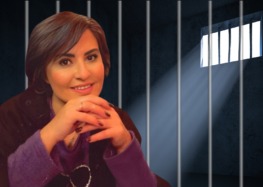Treatment by Guards
A number of the women in the ward reported abusive behavior on the part of female prison guards, which included verbal abuse, rough handling, and inappropriate and unnecessary physical contact that the inmates felt was aimed at humiliating them.
One prisoner reported:
The guards have become really rough and insulting. It’s obvious that’s how they’ve been trained.
They want to humiliate female prisoners. For instance, when [prisoner name withheld] wanted to go on furlough, two female guards did a complete strip search on her. Or when they were bringing [prisoner name withheld] from the [Revolutionary Guard’s Intelligence Organization-controlled] 2-A security ward, where she had already been completely checked over, they again stripped her. They would run their hands on her bare skin. Obviously you can’t hide anything under your skin. They just want to humiliate you.
Initially, [prisoner name withheld] wrote about this stuff in an indirect way. Other prisoners… complained to the prosecutor, which got nowhere. This is a systematic effort to humiliate the prisoners. They want to tell the women that not even their body is safe from abuse. You don’t own your own body.
There was one crude agent who pinched younger prisoners and laughed at them during body searches. These behaviors have very negative effects in the long term. If you try to resist, other prisoners will not back you up. In fact, they will complain to you. It’s so painful in there that no one is in the mood for more trouble.
A former prisoner released two years ago revealed such behavior was not new nor was it an isolated incident:
We had no problems with toilettes and showers. There were sufficient toilette and shower stalls. But our problem was that sometimes they planned to install cameras there, which really upset us, and we would mobilize to have them removed.
Body searches were some of the most abusive things the prison guards could routinely carry out. When they carried out body searches under normal conditions, it wasn’t too infuriating. But sometimes during a visitation, they would touch the [visiting] children’s underwear in an annoying way, to the point that the children would object. They really bothered young children. They brought some [scanning] equipment, but they said that the equipment [scanners] did not detect paper and toilette paper, and when they did the inspection by hand, it was very upsetting. The body searches were carried out to make sure no written notes on paper or toilette papers were passed to visitors.
This above testimony indicates a direct violation of United Nations standards. The UN’s Rules for the Treatment of Women Prisoners and Non-Custodial Measures for Women Offenders (known as the Bangkok Rules) state in Rule 21: “Prison staff shall demonstrate competence, professionalism and sensitivity and shall preserve respect and dignity when searching both children in prison with their mother and children visiting prisoners.”
A family member of a current prisoner reported:
They are always playing games to upset the prisoners through taking away privileges. For example, the women had created a library with their own money, but one day they raided the ward and took away the books.
That the behaviors described in the above testimonies violate both Iranian and international law binding upon the Islamic Republic is clear. Article 39 of Iran’s constitution states: “[All] affronts to the dignity and repute of persons arrested, detained, imprisoned, or banished in accordance with the law, whatever form they may take, are forbidden and liable to punishment.”
More specially, Article 169 of Iran’s State Prison Procedures explicitly prohibits verbal and physical abuse, as well as violent or degrading forms of punishment. It states: “Imprecations, utterance of indecent words, and ill temper toward the accused or prison- er violate the law. All physical, violent, agonizing and insulting punishments are entirely forbidden in penal institutions and prisons.”
Article 7 of the ICCPR similarly stipulates that no one shall be subjected to cruel, inhuman or degrading treatment or punishment, and Article 10 states that all persons deprived of their liberty shall be treated with humanity and with respect for the inherent dignity of the human person.32 The UN’s Basic Principles for the Treatment of Prisoners echoes this, declaring “All prisoners shall be treated with the respect due to their inherent dignity and value as human beings.”


